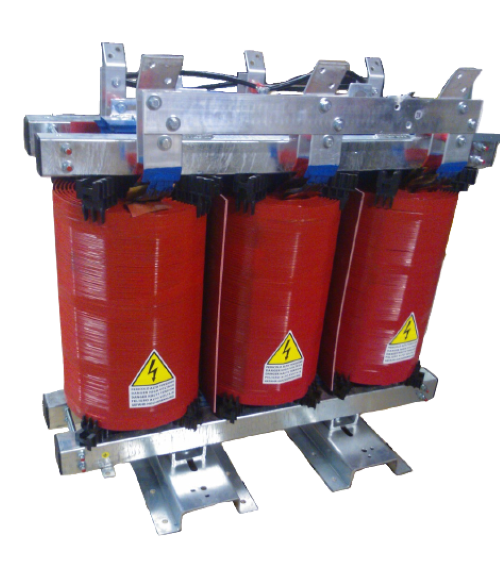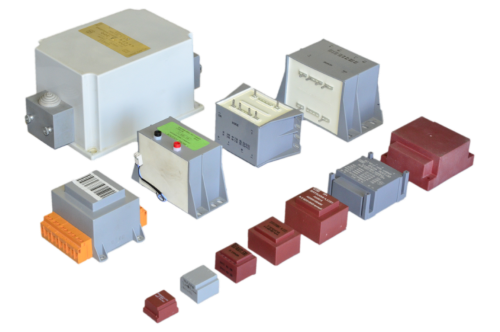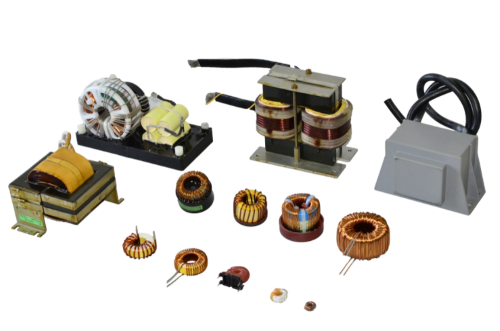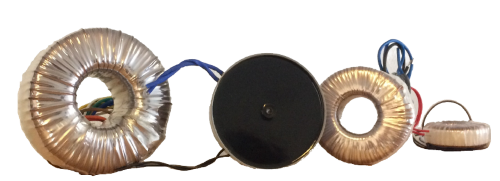A wide range of customised transformers
Master Chips has extensive knowledge and know-how regarding transformers. For many years, we have assisted our clients from the conceptualisation to the final production of their transformers. The starting point may be a completely new transformer, but reverse engineering or replication of old transformers are also possible at Master Chips. You can come to us for all types of transformers, both small and large, low or high voltage, in mass production or limited editions.

Are you looking for a transformer, whether standard or custom-made? Then be sure to contact us and we will gladly go over the possibilities together.
Discover below which transformers we have in our range
Mono-phase transformers
Single-phase transformers are used to change the voltage of a single AC phase and are widely used.
These transformers are often used in applications where the load requires only one phase, as for example in household appliances, lighting and small motors.
They are also useful in industrial applications, where they are used, for example, to reduce the voltage from a primary supply to a level suitable for electronic equipment. The design of single-phase transformers can be simpler than that of three-phase transformers, making them affordable and easy to install.
.png)
Tri-phase transformers
Three-phase transformers are used to change the voltage of a three-phase AC supply to another voltage, for applications in both industrial and commercial environments.
They offer many advantages over single-phase transformers, including higher efficiency and more power. This makes them suitable for heavy-duty applications such as in power plants and large industrial facilities. Three-phase transformers are also used to supply even voltages to motors, pumps, compressors and other equipment that requires three-phase current. Due to their versatility and reliability, three-phase transformers are an important part of the modern power system.


Cast transformers
Cast transformers are transformers whose windings are completely embedded in a casting resin.
This offers a number of advantages over traditional transformers, including better protection against moisture, corrosion and vibration. They also have lower noise production and are resistant to damage from external factors.
In addition, they also offer better cooling properties, allowing them to handle higher loads and offer higher efficiency. Cast transformers are recommended in applications where reliability and durability are important, such as in the oil and gas industry, wind and solar power installations, and in the transport and medical sectors.
PCB transformers
PCB transformers are transformers used on printed circuit boards (PCBs) for electronic devices. These transformers are often used to change electrical voltages, for example to convert high voltage to low voltage.
PCB transformers tend to be smaller and lighter than conventional transformers, making them ideal for use in portable devices and other applications where space is limited. They are also more efficient than some other types of transformers, generating less heat and thus requiring less cooling. However, the design of PCB transformers can be complicated due to the limited space on the PCB and the need to meet specific requirements, such as the required voltage and frequency.

Ring transformers
A ring transformer is a special type of transformer used to change electrical voltages. It has a ring-shaped core and two coils wound around it.
Ring transformers are often used in applications where there is a need for galvanic isolation, where the input and output voltages need to be isolated from each other. This type of transformer also has a very low leakage-inductance effect, making them very suitable for applications with very low signal levels. Ring transformers are available in different sizes and can be adapted to specific applications and requirements. They are often more expensive than conventional transformers, but offer better performance and more reliability.

Let us know how we can help further with our transformers or other products!
And some additional information on Transformers...
Transformers are a type of electrical device used to transfer electrical energy from one circuit to another, usually with a change in voltage or current. They are widely used in various electrical applications, including power distribution, lighting and electronic devices.
A transformer consists of two coils of wire, known as the primary and secondary coils, wound around a magnetic core. When an alternating current (AC) is passed through the primary coil, a magnetic field is created around the core, which in turn induces a voltage in the secondary coil. The voltage induced in the secondary coil depends on the ratio of the number of windings in the primary and secondary coils.
Transformers are designed to operate at a specific frequency and voltage, and are usually rated by their power output in units of VA (volt-ampere) or watts. They come in various sizes and configurations, from small transformers used in electronic devices to large current transformers used in electrical substations.
One of the main advantages of transformers is their ability to transfer electrical energy efficiently over long distances. By increasing the voltage at the source and then reducing it again at the destination, transformers ensure the transfer of power with minimal losses. This makes them essential components of the power grid, as well as of a wide range of other applications.
Besides their use in power distribution, transformers are also commonly used in electronic devices to isolate and regulate voltage levels. For example, isolation transformers are used to isolate circuits to prevent interference, while voltage regulators use transformers to maintain a consistent output voltage.
Overall, transformers play a crucial role in a wide range of electrical applications, making them an essential part of modern technology and infrastructure. Whether you power your home or use electronic devices, chances are you will benefit from the efficient and reliable operation of a transformer.
